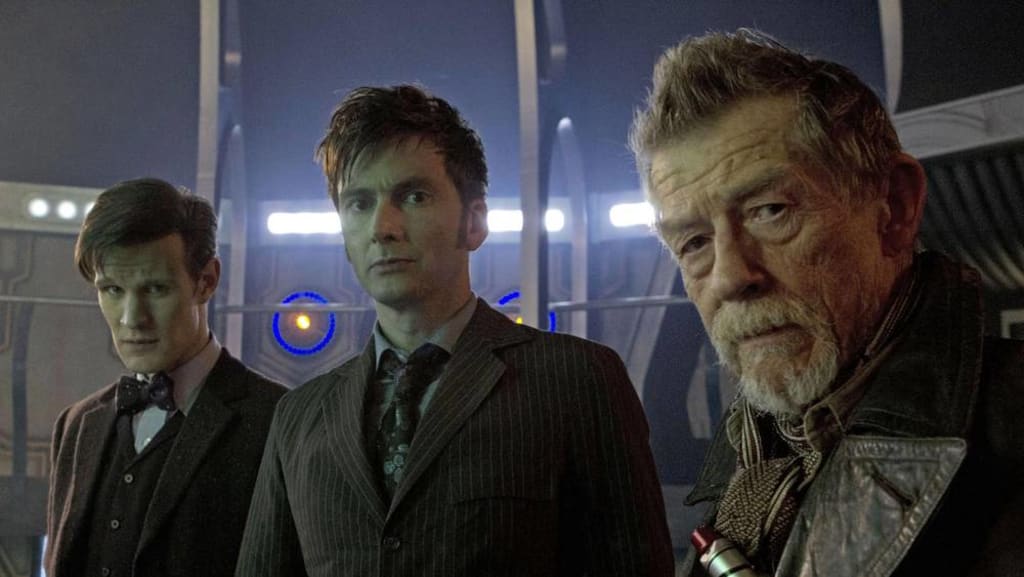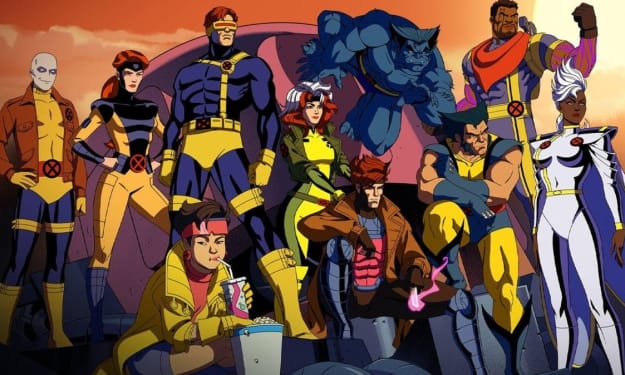
Doctor Who's 50th anniversary feels like something from another era. Even putting aside cultural and political events in the wider world, five years of ups and downs for the program itself make it easy to forget what a joyful celebration Doctor Who's 50th anniversary was. Though some factions in fandom insist that Big Finish Productions' nostalgia-tinged audio drama The Light At The End was "the real 50th anniversary story," the televised celebratory episode The Day Of the Doctor managed to unite fandom on a large scale and remains a high-point in the program's ongoing saga. Of the many people who deserve credit for this unequivocal triumph, writer-producer Steven Moffat ranks high on the list.
Based on his writing for television, one imagines that Moffat enjoys jigsaw puzzles in whatever spare time his professional commitments allow. In the sitcom Coupling, the writer showed a great affinity for making seemingly disparate pieces come together into a satisfying whole, often by playing around with time. Not surprisingly, he pursued this approach even more thoroughly in his work for Doctor Who.
Following his relatively straightforward initial story*, The Empty Child/The Doctor Dances, Moffat grabbed the time travel aspect of the program and ran with it like no other writer in Doctor Who's history. From his first script for David Tennant's Doctor to the overarching story-lines as head-writer during Matt Smith's tenure, time was a key element of the narrative puzzles he assembled. This was true even of the 2007 mini-episode Time Crash, produced for the BBC's Children in Need charity event, which presented a brief meeting between David Tennant's Doctor and his 1980s predecessor, Peter Davison.
With a decade's hindsight, that brief interlude feels like a test run for The Day of the Doctor. Having the current Doctor meet his former selves was done to mark both the 10th and 20th anniversaries of the show and, despite the show not being on TV at the time, the 30th and 40th as well^. This precedent of celebrating the past in a way virtually no other show can inevitably added a tricky piece to their puzzles and often overwhelmed these stories, which all had their moments but generally couldn't be classified as Doctor Who's finest hours. After an uneven run of stories that culminated in The Name of the Doctor, it didn't feel like a given that Moffat would succeed at crafting a puzzle whose pieces included the following:
- Celebrating Doctor Who's past in a way longtime fans would appreciate but didn't require decades worth of background knowledge for everyone else to enjoy.
- Displaying the fun parts of multi-Doctor stories without succumbing to the pitfalls that made previous ones less than great.
- Fostering optimism about a 60th anniversary (and beyond).
Doubts gave way to anticipation a little over a week before The Day of the Doctor premiered, thanks to one of two mini-episodes that had been announced for the story. What made The Night of the Doctor so good was not that it gave longtime fans what they wanted, particularly a return appearance as the Doctor by Paul McGann, but rather that it did so in unexpected ways. In a little under seven minutes, Steven Moffat managed to subvert our assumptions about some key elements of the show's mythology while also telling a sharply written story about gut-wrenching choices. That is also also helped explain how John Hurt as the mysterious "War Doctor" fits into the larger story was simply a bonus.
The idea of a missing incarnation seemed to annoy a lot of hardcore fans, especially when it was announced that none of the show's pre-2005 Doctors would be in the anniversary episode. Despite three of those actors being dead and none of the others except McGann (and perhaps Davison) really looking like they did when they were the current Doctor, many people seemed to prejudge the story as a disappointment solely based on Tennant being the only established past Doctor in it. That attitude is especially amusing in retrospect because having John Hurt as this newly revealed Doctor allowed the multi-doctor element work narratively in a way that none of Tennant's and Smith's predecessors could have.
Because he represented a shadowy period in the Doctor's story before the one that started with Christopher Eccleston's Doctor in Rose, Hurt could embody the Doctor's entire past rather just a single chapter of it. On a nostalgic level, his jabs at Tennant and Smith openly recalled William Hartnell putting his successors in line in 1973's The Three Doctors, but he also personified the tension between who the Doctor was, who he's become and who he should be. More to the point, having an actor of Hurt's calibre seemed to push Tennant and especially Smith out of their comfort zones and into performances as good as they'd ever given as the Doctor. With Jenna Coleman as Clara and Billie Piper as the moment on hand to help the Doctor's various incarnations reconnect with his core values and overcome his greatest challenge, a story that could have been a shallow and incoherent mess felt thoroughly believable on a character level.
Everything else was icing on the cake. At times that icing was a bit heavy, as in the Time War scenes on Gallifrey (presumably intended to give more 3-D bang for the buck), but the return of the Zygons and seeing UNIT again —led by Kate Lethbridge-Stewart and instant fan-favorite Osgood—were deliciously fun. It was also fantastic to see that the line about no pre-2005 Doctors appearing wasn't quite true, and seeing a glimpse of incoming Doctor Peter Capaldi was an unexpected treat that still sparkles. Then, there's an element that's simply beyond objective assessment for many fans, Tom Baker.
Baker declined to appear in the 20th anniversary story The Five Doctors, in which he was only seen in footage from the unfinished story Douglas Adams story Shada. Coming just two years after the end of his seven year run as the Doctor, that decision wasn't surprising, though, Baker later said he regretted it and had re-embraced Doctor Who, particularly in the years leading up to the 50th anniversary. Seeing him as the museum curator who may or may not be another version of the Doctor may or may not make total sense, but here again on the level of character it worked, providing that elusive piece of the puzzle whose final form looks even cooler than imagined.
When Doctor Who reached its 40th birthday in 2003, fans were largely too happy at the prospect of its return to television to wonder what its 50th might hold in store. The almost instant success of the 2005 series made it almost a given that there would be some onscreen adventure to mark that milestone. The program is in a very different place as #55 approaches, but a celebratory story seems more likely than not. It will have a hard act to follow.
-----
*Technically, Moffat's first script for Doctor Who was a 1999 charity sketch called The Curse of the Fatal Death, starring Rowan Atkinson as the Doctor and Jonathan Pryce as the Master. Like all the best parodies, it also worked as a good example of the thing it was spoofing.
^Much could be said about both the 1993 Doctor Who/Eastenders crossover Dimensions in Time and the audio drama Zagreus. A charitable assessment is to say that both were done in good spirit, but neither is especially good.






Comments
There are no comments for this story
Be the first to respond and start the conversation.